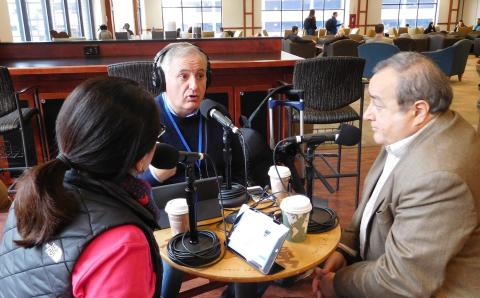Last month I was on a Skype call with a former congregant who now works at a publishing house in Seoul, Korea. After our perfunctory greetings, he wanted me to meet his illustrator. I asked her how she was doing, and, in a moment of honesty, she said she’d been suffering from acid reflux. I asked if she wanted me to pray for her over our internet connection, and she said yes. I felt a bit odd, sort of like a 1980s TV evangelist, as I instinctively raised my hand and proceeded to pray for her. I’m sure that all she saw was a huge hand on her computer screen. Afterward, she said she felt almost completely better. Within a few minutes I received an email from my friend. He confirmed her account and said that the pain in his illustrator’s throat, which she had not mentioned, was also completely gone. She was in shock. I praised God.
I am a Reformed pastor, ordained in the Presbyterian church. My great-grandfather converted to Christianity in the early 1900s in the Pyongyang revivals in what is now North Korea. He became a pastor, served the poor, and died a martyr. I attended Westminster Theological Seminary and devoured the works of Reformed authors. I have also experienced the power and person of the Holy Spirit through deliverances, healings, and other supernatural things. These days, I am experiencing the power and person of the Holy Spirit in the heart of New York City.
God made me an inquisitive person. I want to know how things work. I do not like theory for its own sake, but I want to know the theory behind practical things. Intellectual integrity is important to me. That means, if people are experiencing God in supernatural ways, I want to know the theological basis. After much reflection, I have concluded that the blessings of the new age are a present reality because the kingdom of God is here. Mark’s gospel makes that clear.
Mark 1:15 pronounces the inauguration of the kingdom of God. John the Baptist prepares the way by preaching and baptizing people. Jesus’ first action after this announcement was to call disciples to himself. Shortly thereafter he began to perform miracles: driving out a demon in Capernaum (Mark 1:21-28) and healing many people, including Simon’s mother-in-law (1:29-34), a leper (Mark. 1:40-45), and a paralytic (Mark 2:1-12). This pattern continues in almost every chapter of Mark’s gospel. The cumulative point is clear: the kingdom of God demonstrates the rule of God by manifesting the blessings of the new age. Luke confirms this picture as well. In Luke 11, Jesus is caught in a debate with the crowd. Some say he drives out demons by the power of Beelzebub. Jesus responds by saying, “If I drive out demons by the finger of God, then the kingdom of God has come upon you” (Luke 11:20). According to this logic, the very casting out of demons proves the reality of his reign; the kingdom of God is here.
I am fully aware that not all people who ask for healing are healed. A while ago I prayed for a friend who had just returned from the mission field after six years. I prayed for his shoulder and wrist. Almost immediately, God took care of the shoulder, but nothing happened to his wrist. I do not know why. But this pattern of “success” and “failure” does not bother me unduly because the kingdom of God has been inaugurated but not yet consummated. Theologically I understand that there will be both times of healing and times when the baggage and brokenness of the old age persist.
Here is where we need to decide whether to accent the “already” or the “not yet” character of the kingdom of God. It will come as no surprise that I accent the former.
If the book of Acts is an example of what a community that believes in the power of the kingdom looks like, then the blessings of the new age should accompany the church. It would not be an exaggeration to say that the Spirit of God is the engine and conductor of the book. Immediately after the pouring out of the Spirit (Acts 2), the fledgling church begins to grow.
Through the ministry of Peter, John, and the other apostles, there are mass conversions, notable acts of generosity, and signs and wonders in Jerusalem (Acts 2-6). Even when persecution comes to the church, the work of the Spirit continues: Stephen stands faithful before an angry mob (Acts 7); Samaria receives the gospel through Philip (Acts 8); and Paul, one of the main detractors of the church, is converted (Acts 9). The Spirit also brings Gentiles into the church (Acts 10-12) and starts a Gentile mission through Paul (Acts 13-27). In Acts, we see that the rule of God has exploded into the world through the power of the Spirit.
I’ve heard a lot of messages about being faithful. To be honest, I’ve preached a lot of those messages myself. I believe from the bottom of my heart that our faithfulness honors God and that God blesses it. I’ve also heard my fair share of messages on being fruitful by abiding in Christ. I wholeheartedly agree with these messages as well. What I’d like to add to both of those is the importance of being filled by the Spirit.
Ephesians 5:18 commands us to be filled with the Spirit. A grammatical understanding of the verse is helpful here. First, notice that the verse is an imperative. God is commanding us to be filled. To be faithful, we need to be filled. Second, the imperative is also in the passive voice. This means that the act of filling has to be done to us. We cannot fill ourselves. Here is where prayer comes into play. We need to pray, wait upon God, and take steps of faith.
If we believe that God has already inaugurated his reign and rule on earth, then the primary way to unlock the power of the Holy Spirit is through our believing actions. We have to take concrete steps of faith. We should expect the supernatural as we minister to people. We can pray for people who are sick, for those who are depressed, or down, or defeated. More than that, we can expect the wholeness we will see in the new heaven and new earth to be manifest in our world now. We have actually prayed this prayer a thousand times—“Let your will be done on earth as it is in heaven.”
So what will we do when we feel that God is leading us to that person on the train or bus? How about the sick little girl with her mother at the hospital? Or the family member dealing with addiction? Or those dealing with habitual sins in our communities? Do we believe that God can bring healing, deliverance, and wholeness in our lives? Through the power of the Holy Spirit, God can raise up a church that is faithful, fruitful, and filled.
Discussion Questions
- If you have ever witnessed or personally experienced something supernatural, such as a miraculous healing, describe what happened. How did it occur? How was God glorified through it?
- If, as the author suggests, the kingdom of God is both “already” and “not yet,” which part have you been emphasizing in your spiritual life? Why?
- Is the emphasis on being filled by the Holy Spirit consistent with Reformed theology? Why or why not?
- How can we be more in tune with the Holy Spirit’s guidance in our lives and expectant of the Spirit’s power in our lives?
About the Author
John Lee is an administrator at an independent school and an interim pastor of Newtown Reformed Church in Elmhurst, N.Y. His Ph.D. is in ancient history. He is the author of the book On Generosity (stonetowerpress.com)








